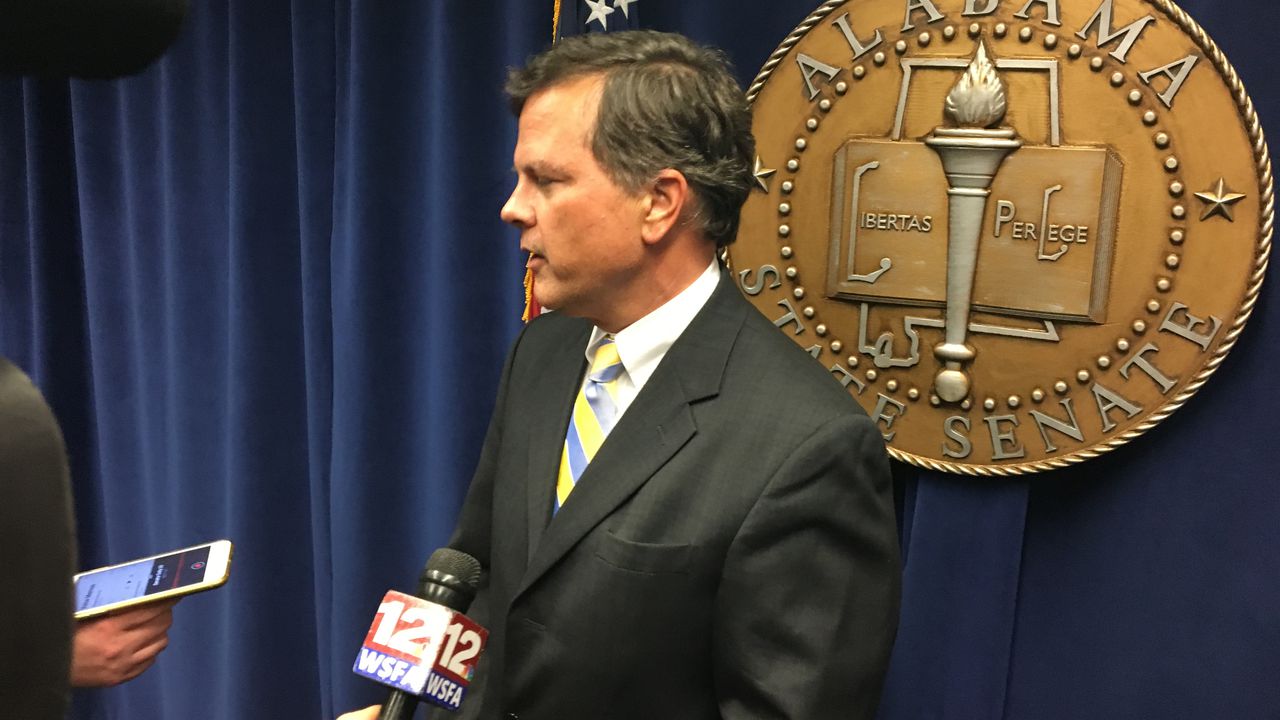Why Alabama might not be the last state to cut the sales tax on groceries
Alabama and Mississippi have the highest poverty rates in the U.S., and its residents pay the highest sales taxes when they purchase groceries.
South Dakota is a rural state, where food insecurity is not nearly as bad as it is in the South. But unlike its neighboring northern states, the home to Mount Rushmore levies a sales tax on groceries at its fullest extent, without offering any credits or rebates for the poor.
The three states, considered by a recent report as the Top 3 most culturally conservative in America, are the final holdouts when it comes to offering any relief on the sales tax rate on groceries.
But Alabama is the only one that can do anything about it this spring. Mississippi and South Dakota lawmakers punted on legislative proposals to eliminate their sales taxes on groceries.
“I don’t know how much impact (there is in) the fact that Alabama is one of only three states that still fully levies a grocery tax plays, but it almost certainly is a factor,” said Justin Bogie, senior director of fiscal policy for the Alabama Policy Institute (API), who advocates for a cut in the sales tax on groceries.
Related content:
Cutting the tax is popular, as polling in Alabama and Mississippi illustrates. Everyone pays a sales tax to buy groceries. The tax is considered regressive because it hits poor people the hardest as they pay a larger share of their income on food than those who are better off financially.
“I think the connection to rising inflation has made the issue more salient and sellable to constituents and policymakers have looked at eliminating the grocery tax as a simple way to relieve some of the pressure of rising prices,” said Eric Figueroa, senior manager of strategic initiatives at the Center on Budget and Policy Priorities. That progressive think tank based in Washington, D.C. analyzes the impact of state government budget policies.
Alabama: Questions loom
Sen. Arthur Orr, R-Decatur. (Mike Cason/[email protected])
Indeed, the momentum is on the side of cutting the state’s 4% sales tax on groceries or provide some sort of permanent tax relief on grocery purchases. The proposal from the Alabama Legislature is likely not to do anything to the sales tax on groceries by municipal and county governments.
The push comes 14 years after Alabama lawmakers bestowed the jokey Shroud Award on legislation that did almost the same thing. The award is given at the end of a legislative session to the bill deemed the “deadest.”
Despite political momentum, plenty of unanswered questions exist on how to handle the tax cut. If fully in place, the tax cut will remove around $500 million from the state’s budget.
How deep of a cut should it be?
How will the state’s education budget be replenished if the cut goes through?
Should junk foods remain taxed, or should the cut be more limited to healthy food options?
“I think it’s too early to tell,” said Senator Arthur Orr, R-Decatur, who chairs the Senate Committee on Finance and Taxation Education, when asked how the policy will formulate during the next few months of the legislative session.
Orr is the sponsor of legislation that would include cutting the state portion of the sales tax on groceries, though he remains skeptical on how the lost revenue will be restored to education budgets. His bill is a gradual repeal of the 4 percent tax on basic foods such as milk, eggs, bread, fresh fruit and vegetables, and infant formula. The exemption would apply to foods that qualify under the federal Women, Infants and Children food assistance program.
“I think people are equating surplus money with needing to cut taxes,” said Orr. “But the staff that has been in Montgomery for decades continues to raise the alarm, which I share the concerns that this is a one-time event.”
He added, “The economists we consult say there will be a reversion back to the mean of the growth we have seen … and we have slight margins, and we cannot afford to overcut and then hurt state government and education in the process.”
Similar concerns interfered with momentum for the grocery tax cuts in South Dakota and Mississippi earlier this year.
In South Dakota, Gov. Kristi Noem, who is considered a rising star in the GOP, is a supporter for a complete elimination of her state’s sales tax on groceries. Mississippi Gov. Tate Reeves, on the other hand, wants to go in a different direction. Reeves is backing a state-approved elimination of its income tax.
Alabama Gov. Kay Ivey has taken a much more reserved stance. She has not pushed for a permanent tax cut but has instead tossed support behind offering rebates.
Alabama Republicans in the Legislature, Lt. Gov. Will Ainsworth, and conservative groups like API argue that rebates don’t go far enough and are angling for more permanent tax cuts.
“When you are talking about attracting new citizens to Alabama versus neighboring states, the grocery tax specifically and the overall tax burden in general certainly factors into the equation,” said Bogie.
South Dakota: Broad base cuts

Governor Kay Ivey greeted South Dakota Governor Kristi Noem as she arrived at the Montgomery Regional Airport Friday August 12, 2022 in Montgomery, Ala. (Governor’s Office/Hal Yeager) Alabama Governor’s Office
In South Dakota, a Republican-dominated Legislature opted to pass a broad base sales tax cut, equating to a $104 million annual cut, versus singling out the state’s sales tax on groceries. The overall cut took the state’s sales tax rate from 4.5% to 4.2% and has a four-year sunset clause.
Rick Wieland, co-founder of Dakotans for Health, said his grassroots organization is looking to take the issue to the ballot box in 2024, via the state’s initiative process.
He said the vocal support of the grocery tax repeal from Republican Gov. Kristie Noem, has pushed the issue to the forefront of policy concerns after previously being opposed to it. Noem, who has not ruled out a possible 2024 GOP presidential bid, made cutting the sales tax on groceries her No. 1 priority when she signaled her support for the issue last fall.
By comparison, Ivey has not signaled support or opposition toward a cut to the sales tax on groceries. Her spokeswoman said this week that the governor is “open to ideas, discussions and solutions to help the people of our state.”
Wieland said Noem’s backing of the grocery tax cut in South Dakota is keeping the issue alive, despite the Legislature’s decision last month not to press forward with it.
“Once Noem came out in favor of it, that took away that the state can’t afford to lose the revenue and zap education, teacher and firefighter pay,” Wieland said. “She took those arguments away and wound up being an advocate. Unfortunately, she could not get her legislature to go along with her.”
Andrea Leschweski, an assistant professor in the Ness School of Management and Economics at South Dakota State University, said Noem is convinced the revenue growth South Dakota experienced in recent years is permanent – about $300 million in new revenues, she said — and cutting the state sales tax on groceries can be sustained without a subsequent revenue cut elsewhere.
Noem’s office said it’s doable. Cutting the state taxes would cost the state $102.4 million in the next fiscal year, they estimated, while not impacting local sales taxes.
Even after the tax cut, Noem’s office predicted the state would have $208 million in ongoing general fund revenue.
“If we were to eliminate it, the lower income households would be able to stretch their dollars further and improve their food security,” Leschweski said. “(The cut) equates to three weeks of groceries, if you add it up.”
Mississippi: Focus on income tax cut
Mississippi has the highest level of food insecurity in the U.S., and the largest state sales tax on groceries. Food insecurity means a lack of access and or a lack of affordability to buying groceries.
Alabama isn’t far behind. According to 2020 data from Feeding America, Alabama’s food insecurity rate is 14.5%, or 711,370 out of the state’s 4.9 million residents. Mississippi, by comparison, has a 16% food insecurity rate – 483,700 out of 3 million residents. South Dakota’s rate is at 8%.
A revenue loss from cutting the grocery tax – which amounts to around $300 million a year – is considered a large hit to Mississippi’s education budget, according to Christopher Newman, associate professor of marketing and the marketing doctoral program director at the University of Mississippi.
“The revenue loss from a potential grocery tax cut would likely further exacerbate this critical issue,” Newman said.
Still, a grocery tax is popular in Mississippi even if lawmakers are not advancing bills to remove the 7% tax. A poll released in January showed 68% of state residents backing the grocery tax cut, while only 28% opposed. The tax cut was backed by a whopping 71% of Republicans, and 65% of Democrats.
The same poll showed far fewer people supporting the income tax cut, which is backed by Reeves and GOP state lawmakers – 55% supported it, while 31% opposed. Of those, 66% of Republicans backed the income tax cut while 23% opposed. Among Democrats, the issue was split: 42% support it, 41% opposed.
A poll released last week in Alabama showed similar results: 83% want the sales tax eliminated, while only 13% oppose. It’s a bipartisan winner as well: 70% of both Democrats and Republicans are supportive.

Mississippi Gov. Tate Reeves speaks at a bill signing in the Governor’s Mansion garden in Jackson, Miss., Tuesday, April 19, 2022. (AP Photo/Rogelio V. Solis)AP
But in Mississippi, state leaders are more focused on the income tax.
“Governor Tate has not been a strong vocal supporter of reducing or eliminating the grocery tax to this point,” said Newman. “His focus has primarily been on the full elimination of the state income tax.”
Mississippi, if lawmakers decide to eliminate the income tax, would be the 10th state in the U.S. to fully eliminate it. The tax accounts for about a third of the state’s overall revenues.
Mississippi lawmakers did approve a gradual reduction of the income tax last year, including a complete elimination of the 4% tax on an individual’s first $4,000 of taxable income. In Alabama, modest income tax cut proposals are surfacing this session, but there is no momentum for an outright elimination of it like there is for cutting the sales tax on groceries.
In Mississippi this spring, the legislation supporting the grocery tax cut flopped and never made it close to the governor’s office. A bill introduced in the Mississippi House in January died in committee. A similar proposal introduced in the Senate could not advance out of that chamber.
“Personally, I believe that a partial elimination of the grocery tax would be the best approach for Mississippi,” Newman said. “Specifically, lowering taxes on healthier food, but maintaining higher taxes on junk food, would help curb its pervasive obesity problem while still providing some revenue streams for public services.”
States explore cuts
A total of 12 states – including Alabama, Mississippi, and South Dakota – have some sort of sales tax on groceries on the books. But those other states either tax groceries at a reduced rate or offer some kind of credit for low-income people.
Orr said considerations beyond and outright cut to the sales tax on groceries could be considered, including the credit. Hawaii, Idaho, Kansas, and Oklahoma tax groceries at the ordinary sales tax rate but provide a credit or rebate to lower-income households intended to offset the tax burden.
Figueroa, with the Center on Budget and Policy Priorities, said that four states last year – Illinois, Kansas, Tennessee, and Virginia – enacted legislation to eliminate or ease the cost of sales tax on food. Virginia lawmakers eliminated their 1.5% tax on groceries effective on January 1, though a 1% tax remains in place for municipalities.
In Tennessee, Gov. Bill Lee is pushing for a three-month holiday from the state’s 4% sales tax on food purchases. The state backed a one-month suspension of the sales tax on food last year.
The proposal would cost Tennessee $288.3 million during the next fiscal year, according to published reports.
“Florida has no sales tax on groceries,” Bogie, with API, said. “Tennessee implemented an extended grocery tax holiday last year and its sales tax on groceries is lower than on other goods and services. Many food items are exempt from sales tax in Georgia.”
Not every state is advancing measures to cut their sales taxes on groceries. In Missouri, which taxes groceries at a lower rate than other goods, an effort to outright rid the state of the sales tax on foods died amid concerns about a corresponding cut to municipalities that was estimated at $1.3 billion. Lawmakers in Missouri, instead, opted to exempt guns, ammunition, diapers, and feminine hygiene products from their state’s sales tax.
State lawmakers in Alabama have taken a more cautious approach toward moving forward on a permanent tax relief solution, while investigating possible scenarios for the cut. The approach has rankled Bogie and others who think the state, following an influx of pandemic relief money, is in financial position to give permanent relief – and not just rebates — to taxpayers.
And on the issue of the grocery tax, conservatives have the support of groups that have long advocated for the poor and often receive the backing from Democrats, like Alabama Arise.
“My hope is they pass something expeditiously and show the voters they mean business,” said Robyn Hyden, executive director of Alabama Arise.
